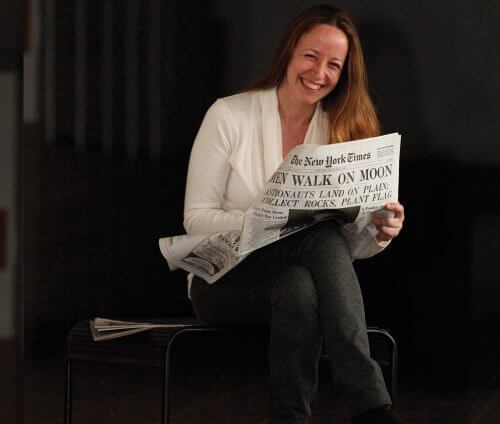Prof. Eilat Baram-Zabari and Prof. Roi Kishoni from the Technion, Dr. Michal Bar-Asher Siegel (Ben-Gurion University of the Negev), Dr. Sefi Handler (Tel-Aviv University), Prof. Yuval Feldman (Bar-Ilan University) , Prof. Avi Zadok (Bar-Ilan University) and Dr. Yael Sternhal (Tel-Aviv University) join the young academy

The Israeli Young Academy adds seven young scientists to its ranks, two of them from the Technion: Prof. Eilat Baram-Zabari from the Faculty of Education for Science and Technology and Prof. Roi Kishoni from the faculties of Biology and Computer Science. Dr. Michal Bar-Asher Siegel (Ben-Gurion University of the Negev), Dr. Sefi Handler (Tel-Aviv University), Prof. Yuval Feldman (Bar-Ilan University), Prof. Avi Zadok (Bar-Ilan University) and Dr. Rabbi Yael Sternhal (Tel Aviv University).
Making science accessible to the public
Prof. Baram-Zbari, a pioneer in the field of science communication in Israel, completed a bachelor's degree in the outstanding program of the Faculty of Life Sciences at Tel Aviv University, a doctorate in a direct track in the science teaching department at the Weizmann Institute and a post-doctorate at Cornell University. She harnesses the extensive academic knowledge and journalistic experience she has acquired ("The City", "Bamahane", "Globes", the Science Channel and channels 10 and 2) for research, teaching and public influence in the field of science communication. This, according to her, is with the aim of "bridging the public's right to know and the public's ability to understand."
Prof. Baram-Zbari, 39, is a member of the Lynx Center of Excellence - Learning in the Information Society, and this year won the Yanai Award given to faculty members at the Technion for "significant contribution to the advancement of academic education." She heads the academic committee of the science communication conference series, which she founded in collaboration with the National Academy of Sciences. Prof. Baram-Zbari, who serves as the chairman of the research committee of the Second Authority for Television and Radio, responsible for the regulation of commercial broadcasting in Israel, is also the first Israeli representative in the management of PCST - the International Organization for Science Communication.
About two years ago, Prof. Baram-Zabari was invited to the world's largest center for particle research, located at CERN, Switzerland. This is to study CERN's science communication challenges, for example the rumors about "a black hole that will be created in the particle accelerator and swallow the Earth". Similar rumors have surfaced before the activation of other particle accelerators, but this time a new precursor to hysteria was added to the picture: the sharing on social networks, which turned the unfounded rumors into viral prophecies of rage. Last Friday, an article was published in the journal PLOS ONE written by Prof. Baram-Zabari together with doctoral student Aviv Sharon and Kate Kahle, the director of social media at CERN. In the article, the researchers examine the public's involvement in the field of particle physics based on the dynamics in social networks.
Specific medicine for each infection
Prof. Roy Kishoni, a faculty member in the Faculty of Biology at the Technion and has a secondary appointment in the Faculty of Computer Science, completed a bachelor's degree in physics and mathematics at the Hebrew University (as part of the Telpiot project) and a doctorate in physics at Tel Aviv University. After that he spent about 14 years in the USA, during which he completed a post-doctorate at Princeton and Rockefeller University and continued his research on bacterial evolution in the Department of Systems Biology at Harvard, where he was a full professor. In 2013 he returned to Israel and joined the Technion as a faculty member in the Faculty of Biology. Many senior officials at the Technion worked on his recruitment to the Technion, including Technion President Prof. Peretz Lavi, former Technion Vice President for Academic Affairs Prof. Gadi Shuster and Nobel Prize Winner in Chemistry Prof. Aharon Chachanover.
Prof. Kishoni's laboratory deals with various fields related to bacteria, their evolution and their interactions with the environment and with medicinal substances. The main project of the laboratory today is a comprehensive mapping of the world's bacteria and their characteristics, including mutations that make bacteria resistant to antibiotics. Prof. Kishoni's research, which was published in leading journals such as Nature and Science, is particularly important in view of the fear that the expansion of resistance to antibiotic drugs is leading humanity towards a "post-antibiotic" era, in which infections and minor injuries will cause severe health damage. According to him, the research being carried out in his laboratory in this context is intended to "allow us to predict how a specific drug will affect the specific patient. The idea is that based on reading the genome of the bacterium that causes the disease, we can match each infection with the most effective medicine for it, while avoiding medicines that the bacterium is resistant to or may develop resistance to."
Academic excellence and social involvement
The Israeli Young Academy, which operates within the framework of the Israeli National Academy of Sciences, aims to promote the status of young scientists in Israel and improve their relations with Israeli society, with decision makers and with young researchers from around the world. Its members, prominent scientists in their field, are chosen based on academic excellence and public-social involvement. In 2012, two faculty members from the Technion joined the Academy: Prof. Yonina Elder (Faculty of Electrical Engineering named after Andrew Varna Viterbi) and Prof. Lior Gepstein (Faculty of Medicine named after Rappaport).
